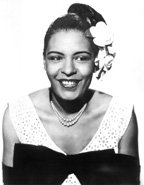






| Strange
Fruit
While many people assume Strange Fruit was written by Billie Holiday herself, it actually began as a poem by a Jewish schoolteacher and union activist from the Bronx who later set it to music. Disturbed by a photograph of a lynching, the teacher wrote the stark verse and brooding melody about the horror of lynching under the pseudonym Lewis Allan in 1938. It was first performed at a New York teachers' union rally and was brought to the attention of the manager of Cafe Society, a popular Greenwich Village nightclub, who introduced Billy Holiday to the writer. Holiday's record label refused to record the song. Holiday persisted and recorded it on a specialty label instead. The song was quickly adopted as the anthem for the anti-lynching movement. The haunting lyric and melody made it impossible for white Americans and politicians to ignore any more the Southern campaign of racist terror. According to the Center for Constitutional Rights, between 1882 and 1968, mobs lynched 4,743 persons in the United States, over 70 percent of them African-Americans. The documentary includes a moving recitation of the lyric by Abbey Lincoln and a powerful musical performance by Cassandra Wilson. But it's the footage of Lady Day herself performing her bitter and heart-wrenching signature song that stands at the center of the film. Holiday sang it until her death in 1959. Folk singer Pete Seeger, playwright and critic Amiri Baraka, veteran Civil Rights activist Rev. Dr. C.T. Vivian, and Milt Gabler of Commodore Records, which first recorded Strange Fruit with Billie Holiday in 1939, add their voices to the story. The schoolteacher who penned Strange Fruit under the pseudonym Lewis Allen was named Abel Meeropol, the same Abe Meeropol who adopted the two sons of "atom bomb spies" Julius and Ethel Rosenberg after their 1953 execution. The boys, now middle-aged, help relate the tale, illuminating the fevered world of art and politics in which they grew up. Educators in American History, Black Studies, American Studies, Social History, Jewish American History, Radicalism, Popular Culture, Social Movements, and Ethnomusicology will find Strange Fruit and its multi-level themes an exciting teaching tool. The film concludes with a montage of recent hate crimes indicating that Strange Fruit remains all-too-relevant today. STRANGE FRUIT |
"A devastating
yet inspiring reminder of when racial terror raged through this country
and when blacks and whites worked together to stop it. This film can
help strengthen this same struggle in our own era." "Straightforward
yet nuanced, Strange Fruit tells a story that must be
told. We know the importance of Billie Holiday's recording. But this
indispensable video fills in the history binding the struggle against
lynching and for black rights with a wealth of common history of African
Americans, Jewish Americans, and the American Left. We need to learn
this chapter in our past." "Part of our
history, part of our heritage. Strange Fruit captures
with vivid imagery the history of a song that created immediate controversy
as a grim reminder of a necessarily painful and ugly chapter in American
history. The song retains its force, because the issues it raises about
the legacy of racial terrorism in American society still resonate. Except
for Strange Fruit, none of the victims were ever memorialized,
their stories & legacies are all but forgotten. This is a fascinating
story about a song that compelled its audiences to confont the past
in ways that could be genuinely disturbing. It is no less disturbing
today." "This film is
an invaluable illumination of how a singer and a song helped to permanently
awaken Americans to a horrifying part of our past that still affects
the present. I knew Billie Holiday and how deeply Strange Fruit
affected her -- as this film vividly shows." "An excellent documentary ... A thoughtful discussion prompter." --Booklist "For all audiences,
this reflection on a unique song brilliantly captures the relationship
between social art and our real lives and history."
Producer/Director:
Joel Katz
For Screenings on 35mm Film, please contact the Producer, Joel Katz
by email at jkatz@igc.org .
|
 Strange
Fruit is the first documentary exploring the history and legacy
of the Billie Holiday classic. This history of the song's evolution
tells a dramatic story of America's radical past using one of the most
influential protest songs ever written as its epicenter. The saga brings
viewers face- to- face with the terror of lynching even as it spotlights
the courage and heroism of those who fought for racial justice when
to do so was to risk ostracism and livelihood if white - and death if
Black. It examines the history of lynching, and the interplay of race,
labor and the left, and popular culture as forces that would give rise
to the Civil Rights Movement.
Strange
Fruit is the first documentary exploring the history and legacy
of the Billie Holiday classic. This history of the song's evolution
tells a dramatic story of America's radical past using one of the most
influential protest songs ever written as its epicenter. The saga brings
viewers face- to- face with the terror of lynching even as it spotlights
the courage and heroism of those who fought for racial justice when
to do so was to risk ostracism and livelihood if white - and death if
Black. It examines the history of lynching, and the interplay of race,
labor and the left, and popular culture as forces that would give rise
to the Civil Rights Movement.